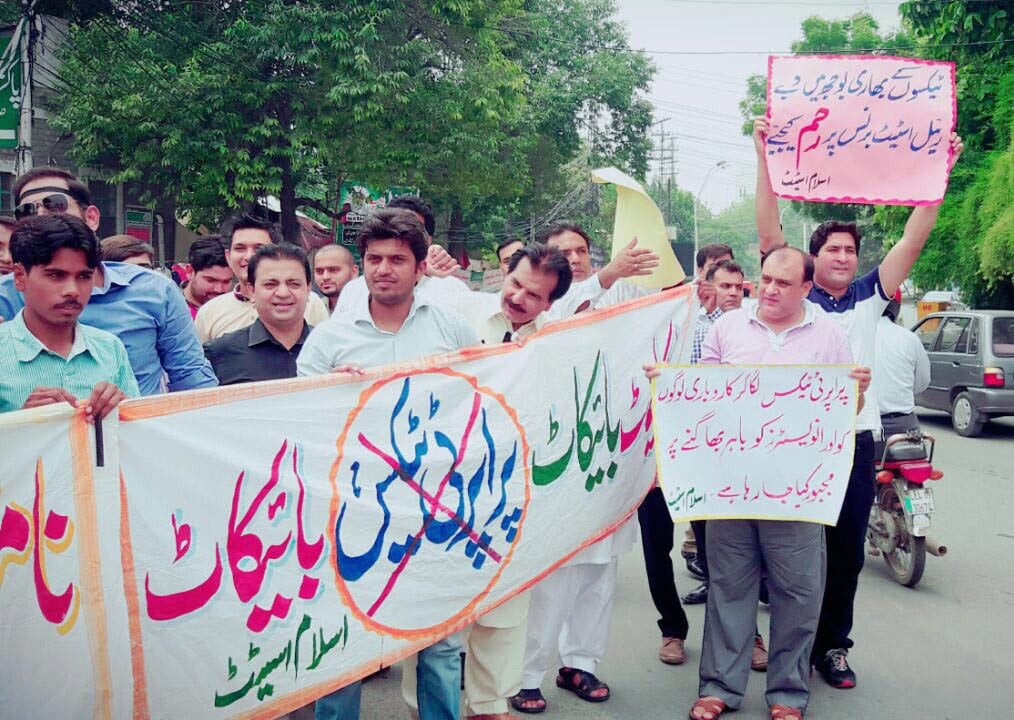
As the property business comes to a grinding halt, the government and real estate agents try to work out a consensual formula

After many rounds of talks with property dealers and investors, the government is set to introduce a lopsided property tax regime benefiting only big investors, property tycoons with no incentives for the lower and middle classes that anchor socio-economic development in the country. As fresh tax scenario has nothing to do with fixation of property value, market will remain highly speculative leaving a gigantic gap between the state prescribed price and fair market price of plots and buildings (residential and commercial).
The government jolted the property market with section 68 of the Income Tax Ordinance, 2001 through the Finance Act, 2016 tasking the State Bank of Pakistan (SBP) to determine real time value of all properties through its 106 valuers against the DC (Deputy Commissioner) rate believed to be always undervalued in comparison to actual market price. This development to collect high revenue from property transactions terminated the role of provincial governments which earlier had full authority to tax property transactions through DC rates.
After furious protests, a 13-member team of property dealers and builders met Adviser to the Prime Minister on Revenue Haroon Akhter Khan and, after many meetings, reached a formula that will be approved by Finance Minister Ishaq Dar next week.
Property dealers and builders will be beneficiary of a tax amnesty scheme to help whiten Rs7 trillion untaxed and black money parked in the real estate sector through a presidential ordinance. It was agreed during the meetings that a presidential ordinance will be promulgated soon giving the property dealers an opportunity to whiten their money. The government has assured them that they will not be asked about the source of money they are going to invest in the property deals.
Major (Retd) Rafiq Hasrat, a part of the 13-member committee that negotiated the deal with the government, says "The chapter of SBP valuers has been closed once for all and all things will be decided under a new formula to be agreed upon between the FBR and other stakeholders."
"The DC rate is back in business again. There will be an increase of three to seven per cent tax on various heads like stamp duties, Capital Value Tax (CVT), corporation tax, withholding tax and others on sale and purchase of property. Meanwhile, a 10 per cent gain tax will also be applicable," DHA Real Estate Association Vice President Arshad Khokhar mentions. "Investors will not get any notice from the FBR requiring the source of money being invested in property."
Meanwhile, a Johar Town property dealer, Hayat Khan, says that leaving the value of property undecided will keep the property business thriving with huge financial gains for the land mafia. "Two or three times higher tax on property transactions will not affect the real estate business."
Experts believe it is likely that the agreed formula will help the government collect some more taxes. The property prices may stabilise if the price of a property is fixed on market rate. As in practice, the prices of plots and property are manipulated by real estate dealers and investors to bag maximum profits.
Investment from lower middle class, middle class and upper class helped the real estate market grow. The property business boomed during the last decade after trillion of rupees were invested by wealthy businessmen including oversees Pakistanis. As no rules were devised to document the flood of investment, an estimated Rs7 trillion black money was parked in the real estate market, according to the FBR officials.
Concentration of maximum capital in the real estate industry left other businesses drained out. These odd trends sounded alarm bells for the economy, but the government initially ignored it. Before the budget 2016-17, the government woke up to the reality and instead of tuning the overfed property business to bring monetary fortunes for both state and stakeholders, the government launched unviable revenue generation plan through Finance Bill 2016.
The real estate industry that remained unhurt weathering economic meltdown, power and gas crisis, terrorism and political unrest, hit the rock bottom with effect from July 1, 2016. Since then, it is speculated that the property industry is going to meet the fate of other industries that suffered due to lopsided policies designed by financial experts of the government.
The property market almost crashed after the announcement of Finance Bill 2016. Property markets, doing a roaring business in Lahore, Karachi, Islamabad, Peshawar, Faisalabad, Gujranwala, Multan and other parts of the country, wore a deserted look during the last three weeks of the current month.
The real estate’s allied industries, including construction, cement, iron, brick, marble, PVC pipes and sanitary ware, have also been witnessing a negative impact. Another drastic damage being felt in the market is massive layoff.
Former finance minister and economist, Salman Shah, says that there are various ways to deal with black money being poured in the real estate industry. "The government clampdown on the ongoing activity will spur capital flight and drain out the market," he fears. He advises the government to take into consideration economic consequences of its move to generate more revenue. People, he predicts, will go for opening offshore companies and Swiss bank accounts to park their money if the ill-conceived property taxation plan is not aborted.